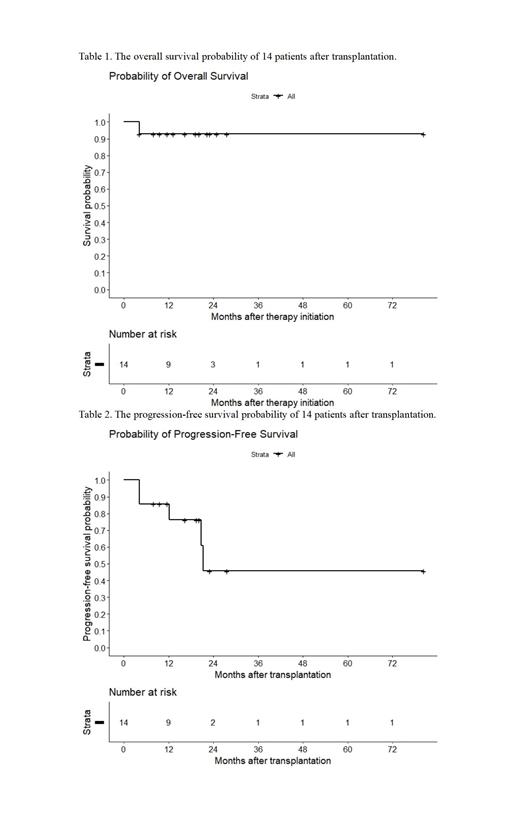Objective: With the new therapeutic agents developed over last decades, the median survival of patients with multiple myeloma has approached 10 years. However, 15-20% of patients who are classified as High-risk multiple myeloma (HRMM) patients still have a median survival of less than 3 years, which leaves room for improvements. Simultaneously, transplantation related mortality (TRM) has been decreasing since progress of supportive care during these years. Thus, this study aims to evaluate the efficacy of allogeneic hematopoietic stem cell transplantation (allo-HSCT) in young high-risk multiple myeloma (HRMM) patients and to conduct statistical analysis of various prognostic factors in the new era.
Method: This retrospective study analyzed clinical data from 14 young multiple myeloma patients with high-risk cytogenetic abnormalities or high-risk disease biological factors who underwent allo-HSCT at the Hematopoietic Stem Cell Transplantation Center of the Institute of Hematology & Blood Diseases Hospital between November 2016 and November 2022.
Results: There were 7 males and 7 females involved in this study, with a median age of 39.5 (31- 50) years at the time of transplantation. The median number of treatment lines before transplantation was 2 (1-6). Before transplantation, 42.9% (6/14) of the patients did not achieve complete remission (CR), with 35.7% (5/14) of the patients performing MRD (+). After transplantation, all patients could be evaluated for treatment response, in which the overall response rate was 100% (14/14). All 14 patients successfully underwent transplantation, with median engraftment times for neutrophils and platelets of 11 (10-14) days and 13 (9-103) days, respectively. Acute graft-versus-host disease (GVHD) of grades II-IV occurred in 5 patients (35.7%), and 2 patients (14.3%) developed moderate to severe chronic GVHD. The median follow-up time after transplantation was 18.93 (4.1-72.53) months, with the 2-year TRM of 7.1% (95%CI 0-19.7%) and the expected 2-year overall survival (OS) rate of 92.9% (95% CI 80.3-100%). Meanwhile, the expected 1-year and 2-year progression-free survival rates were 85.7% (95% CI 69.2-100%) and 45.7% (95% CI 20.9-99.9%), respectively, and the presence of chronic GVHD might influence the outcome positively.
Conclusion: Allogeneic hematopoietic stem cell transplantation is an effective treatment to improve the prognosis of young and high-risk multiple myeloma patients.
Disclosures
No relevant conflicts of interest to declare.


This feature is available to Subscribers Only
Sign In or Create an Account Close Modal